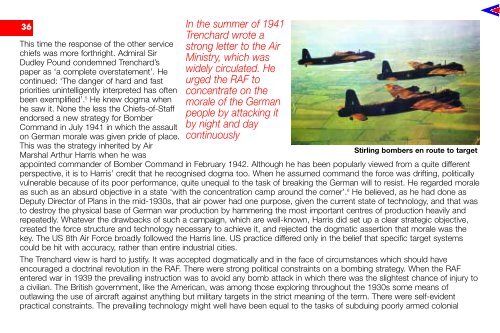THE RAF AIR POWER REVIEW - Royal Air Force Centre for Air ...
THE RAF AIR POWER REVIEW - Royal Air Force Centre for Air ...
THE RAF AIR POWER REVIEW - Royal Air Force Centre for Air ...
You also want an ePaper? Increase the reach of your titles
YUMPU automatically turns print PDFs into web optimized ePapers that Google loves.
36 In the summer of 1941<br />
Trenchard wrote a<br />
strong letter to the <strong>Air</strong><br />
Ministry, which was<br />
widely circulated. He<br />
urged the <strong>RAF</strong> to<br />
concentrate on the<br />
morale of the German<br />
people by attacking it<br />
by night and day<br />
continuously<br />
This time the response of the other service<br />
chiefs was more <strong>for</strong>thright. Admiral Sir<br />
Dudley Pound condemned Trenchard’s<br />
paper as ‘a complete overstatement’. He<br />
continued: ‘The danger of hard and fast<br />
priorities unintelligently interpreted has often<br />
been exemplified’. 5 He knew dogma when<br />
he saw it. None the less the Chiefs-of-Staff<br />
endorsed a new strategy <strong>for</strong> Bomber<br />
Command in July 1941 in which the assault<br />
on German morale was given pride of place.<br />
This was the strategy inherited by <strong>Air</strong><br />
Marshal Arthur Harris when he was<br />
Stirling bombers en route to target<br />
appointed commander of Bomber Command in February 1942. Although he has been popularly viewed from a quite different<br />
perspective, it is to Harris’ credit that he recognised dogma too. When he assumed command the <strong>for</strong>ce was drifting, politically<br />
vulnerable because of its poor per<strong>for</strong>mance, quite unequal to the task of breaking the German will to resist. He regarded morale<br />
as such as an absurd objective in a state ‘with the concentration camp around the corner’. 6 He believed, as he had done as<br />
Deputy Director of Plans in the mid-1930s, that air power had one purpose, given the current state of technology, and that was<br />
to destroy the physical base of German war production by hammering the most important centres of production heavily and<br />
repeatedly. Whatever the drawbacks of such a campaign, which are well-known, Harris did set up a clear strategic objective,<br />
created the <strong>for</strong>ce structure and technology necessary to achieve it, and rejected the dogmatic assertion that morale was the<br />
key. The US 8th <strong>Air</strong> <strong>Force</strong> broadly followed the Harris line. US practice differed only in the belief that specific target systems<br />
could be hit with accuracy, rather than entire industrial cities.<br />
The Trenchard view is hard to justify. It was accepted dogmatically and in the face of circumstances which should have<br />
encouraged a doctrinal revolution in the <strong>RAF</strong>. There were strong political constraints on a bombing strategy. When the <strong>RAF</strong><br />
entered war in 1939 the prevailing instruction was to avoid any bomb attack in which there was the slightest chance of injury to<br />
a civilian. The British government, like the American, was among those exploring throughout the 1930s some means of<br />
outlawing the use of aircraft against anything but military targets in the strict meaning of the term. There were self-evident<br />
practical constraints. The prevailing technology might well have been equal to the tasks of subduing poorly armed colonial

















